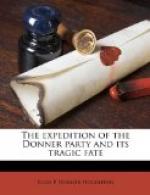Captain Russell had despatched matters vigorously and tactfully, and when the labors of that day were completed, still had a word of cheer for the shivering, hungry travellers, whom he led into camp one mile west of the memorable Big Blue. Despite stiff joints and severe colds, all were anxious to resume travel at the usual hour next day, June the first.
CHAPTER III
IN THE HAUNTS OF THE PAWNEES—LETTERS OF MRS. GEORGE DONNER—HALT AT FORT BERNARD—SIOUX INDIANS AT FORT LARAMIE.
We were now near the haunts of the Pawnee Indians, reported to be “vicious savages and daring thieves.” Before us also stretched the summer range of the antelope, deer, elk, and buffalo. The effort to keep out of the way of the Pawnees, and the desire to catch sight of the big game, urged us on at a good rate of speed, but not fast enough to keep our belligerents on good behavior. Before night they had not only renewed their former troubles, but come to blows, and insulted our Captain, who had tried to separate them. How the company was relieved of them is thus told in Mr. Bryant’s Journal:
June 2, 1846, the two individuals
at variance about their oxen and
wagon were emigrants to Oregon,
and some eighteen or twenty wagons
now travelling with us were
bound to the same place.
It was proposed in order to relieve ourselves from consequences of dispute in which we had no interest, that all Oregon emigrants should, in respectful manner and friendly spirit, be requested to separate themselves from the California, and start on in advance of us. The proposition was unanimously carried; and the spirit in which it was made prevented any bad feeling which otherwise might have resulted from it. The Oregon emigrants immediately drew their wagons from the corrals and proceeded on their way.
The Oregon company was never so far in advance that we could not hear from it, and on various occasions, some of its members sent to us for medicines and other necessaries.
Our fear of the Pawnees diminished as we proceeded, and met in their haunts only friendly Indians returning from the hunt, with ponies heavily laden with packs of jerked meats and dried buffalo tongues. At least one brave in each party could make himself understood by word or sign. Many could pronounce the one word “hogmeat,” and would show what they had to exchange for the coveted luxury. Others also begged for “tobac,” and sugar, and generally got a little.
A surprising number of trappers and traders, returning to the United States with their stocks of peltry, camped near us from time to time. They were glad to exchange information, and kept us posted in regard to the condition of the migrants, and the number of wagons on the road in advance. These rough-looking fellows courteously offered to carry the company’s mail to the nearest post-office. Mr. Bryant and my mother availed themselves of the kindness, and sent letters to the respective journals of which they were correspondents.




